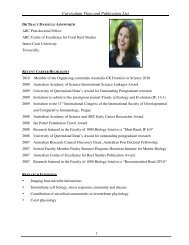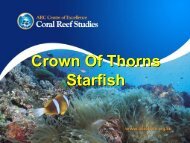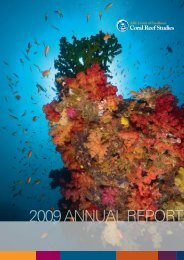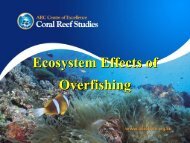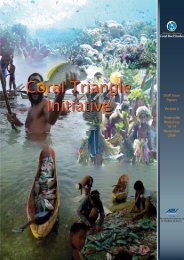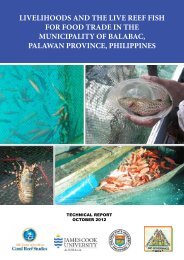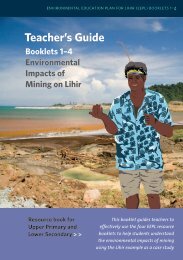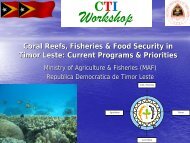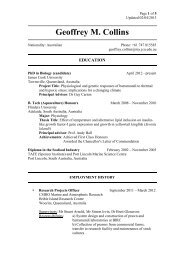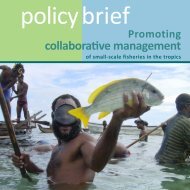Download - ARC Centre of Excellence for Coral Reef Studies
Download - ARC Centre of Excellence for Coral Reef Studies
Download - ARC Centre of Excellence for Coral Reef Studies
You also want an ePaper? Increase the reach of your titles
YUMPU automatically turns print PDFs into web optimized ePapers that Google loves.
Program 2:Understanding andManaging <strong>Coral</strong> <strong>Reef</strong>BiodiversityResearchersDavid Bellwood (Program Leader)Andrew Baird (Research Fellow)Sean ConnollyTerry Hughes (Research Fellow)Ge<strong>of</strong>frey JonesRonald KarlsonPippa Moore (Research Fellow)Philip Munday (Research Fellow)John PandolfiMorgan Pratchett (Research Fellow)Robert SteneckThough widely recognized as a criticalfactor <strong>for</strong> the maintenance <strong>of</strong> robustecosystems, biodiversity at local andglobal scales is poorly understood.Program 2 aims to understand themechanisms and processes that maintaincoral reef biodiversity, using a combination<strong>of</strong> mathematical modeling and fieldstudies. This multi-disciplinary approachin<strong>for</strong>ms knowledge-based management<strong>of</strong> biodiversity resulting in environmental,social and economic benefit to tropicalmaritime nations.Australian Research Fellow, PhilipMunday, in collaboration with colleaguesat the University <strong>of</strong> Cali<strong>for</strong>nia SantaBarbara, has identified the mechanismsunderlying the diverse sexual strategiesin sex-changing fishes. Munday’s 2006research, published in Proceedings <strong>of</strong> theRoyal Society, showed that the interplaybetween genes and the environment earlyin life plays a key role in which individualsbecome primary males or females. Thisresearch contributes to the increasingappreciation <strong>of</strong> the diversity and flexibility<strong>of</strong> sexual strategies in fishes.In a related study, Mark McCormick foundthat stressed fish have smaller <strong>of</strong>fspring,with lower chances <strong>of</strong> survival. Theability to cope with stress – and producelarge, healthy fry – determines whichfemales contribute to future generationsand influences the resilience <strong>of</strong> fishpopulations. Mark and Ge<strong>of</strong>f Jones havesecured a 3-year contract with the NatureConservancy to monitor coral reef health,biodiversity and fisheries resources in 4local marine reserves in Kimbe Bay, PapuaNew Guinea. The project will analyze theefficiency <strong>of</strong> current marine conservationef<strong>for</strong>ts and use this data to implementfuture marine conservation strategies inthe Bay.The increasing violence <strong>of</strong> storms underglobal climate change will have majoreffects on coral reefs – and has importantimplications <strong>for</strong> their future management.In a paper in Nature, JCU graduateJoshua Madin and Sean Connolly usemathematical models to calculate the<strong>for</strong>ces that coral is subjected to by wave,storm surge or tsunami, and the probability<strong>of</strong> the colonies being dislodged from thesea-bed. These new models provide anessential tool to predict how coral reefswill look under different future scenarios,and to plan accordingly.Understanding, predicting and managingthe potential impacts <strong>of</strong> climate changeon coral reef ecosystems is a major focus<strong>of</strong> many <strong>of</strong> the <strong>Centre</strong>’s projects. In 2006,Program 2 researchers examined theeffects <strong>of</strong> climate-induced coral depletionon coral reef fishes, in collaborationwith colleagues from the University <strong>of</strong>Newcastle-upon-Tyne and UC SantaBarbara. Work was conducted in Australia,Fiji, French Polynesia, PNG, and atseveral locations in the Indian Ocean,highlighting a new area <strong>of</strong> expertisewithin the <strong>ARC</strong> <strong>Centre</strong>. For example, ateam led by Australian Research FellowMorgan Pratchett documented significantpopulation declines and localizedextinctions <strong>of</strong> coral-feeding butterflyfisheson the Great Barrier <strong>Reef</strong>, following coralbleaching. Morgan and Andrew Bairdalso gave a series <strong>of</strong> briefings in 2006to the Western Australia oil and gasindustry, on a range <strong>of</strong> issues, includingthe use <strong>of</strong> coral spawning predictions<strong>for</strong> management, the scale <strong>of</strong> spatialstock-recruitment relationships, and theconsequences <strong>of</strong> recruitment failure <strong>of</strong>coral reef organisms.A series <strong>of</strong> high-pr<strong>of</strong>ile publications in2006 and 2007 demonstrate that fishwill play a vital role in the response <strong>of</strong>Australia’s Great Barrier <strong>Reef</strong> to climatechange. A team <strong>of</strong> 8 researchers fromProgram 2 and 5, led by <strong>Centre</strong> DirectorTerry Hughes, undertook a large-scalefish-exclusion experiment to explore therole <strong>of</strong> herbivorous fishes in bolstering theresilience <strong>of</strong> corals to global warming.The experiment tracked the recovery <strong>of</strong>corals following severe bleaching, in areas<strong>of</strong> reef where fish were experimentallyexcluded, and on adjacent areas withina no-fishing zone. In the absence <strong>of</strong> fish,the corals failed to recover, and instead aphase-shift occurred from dominance bycorals to a reef covered by dense stands<strong>of</strong> seaweed. Where fish were abundant,coral cover more than doubled, and noalgal bloom occurred. The team concludedthat maintaining intact fish populationswill be vital to successfully managing theresilience <strong>of</strong> tropical coral reefs from theimpacts <strong>of</strong> climate change and humanactivity. These results strongly supportmanagement strategies <strong>of</strong> the GreatBarrier <strong>Reef</strong> Marine Park Authority andother coral reef agencies worldwide. Theimportance <strong>of</strong> this project is accentuatedby the findings <strong>of</strong> the April 6 th 2007 report<strong>of</strong> the IPCC, which the <strong>ARC</strong> <strong>Centre</strong> <strong>of</strong><strong>Excellence</strong> contributed to.16



